8 results
Common Core RI.6.1 laboratory microsofts
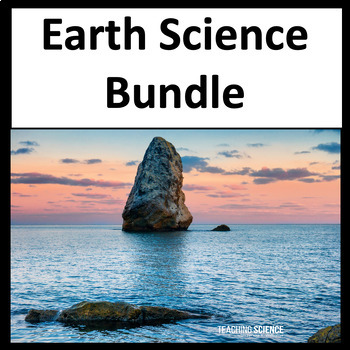
Middle School Earth Science Changes to the Earth's Surface and Earth's Systems
Are you looking for an Earth Science Bundle? This is a bundle of resources on Earth Science for Middle School. Purchase together here and save 20%. This resource is designed to meet the NGSS Disciplinary Core Ideas: History of The Planet Earth, Plate Tectonics and Large-Scale System Interactions, Earth's Materials and Systems, and the Role of Water in Earth's Surface Processes. Students will be engaged in hands-on labs and close reading passages to learn about Earth Systems and how they continua
Grades:
6th - 8th
NGSS:
MS-ESS1-4
, MS-ESS2-3
, MS-ESS2-2
, MS-ESS2-1
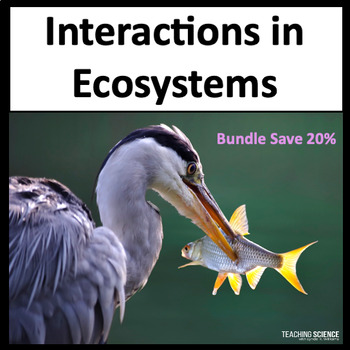
Ecosystems Activities & Interactions & Food Webs & Resource Availability
This HUGE Bundle addresses the NGSS MS LS Interactions, Energy, and Dynamics. Students will learn about interactions between organisms, cycling of matter and flow of energy, physical and biological components of an ecosystem, and designing a solution to address an ecological problem.This Bundle Contains:Slide ShowsReading PassagesResponse PagesInteractive Notebook InsertsLabsLab PagesAssessmentsEcosystem ActivitiesThis Ecosystem Bundle Includes:Ecosystems Patterns and InteractionsEcosystem Food
Subjects:
Grades:
6th - 8th
Types:
NGSS:
MS-LS2-2
, MS-LS2-3
, MS-LS2-5
, MS-LS2-4
, MS-LS2-1
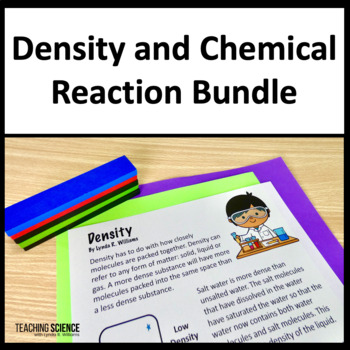
NGSS Middle Chemical Reactions and Density Bundle
This is a collection of labs and science experiments for chemical reactions and density. Enjoy this collection here at a 20% discount. Students will enjoy these hands-on colorful and engaging science experiments. This unit includes chemical reactions and density experiments.This resource includes Hands-on lessons, Close Reading Passages, Interactive Notebook Flaps, Response Pages, and more.Science and Engineering Practices Used by Students:1. Asking questions (for science) and defining problems
Subjects:
Grades:
6th - 7th
NGSS:
MS-PS1-4
, MS-PS1-2
, MS-PS1-3
, MS-PS1-5
, MS-PS1-1
...
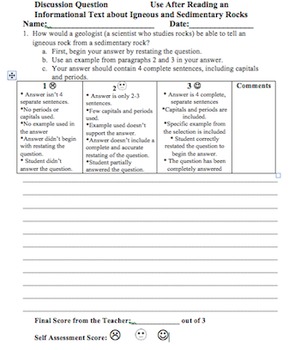
Discussion Question: How Geologists Tell Between an Igneous/Sedimentary Rocks
This discussion question asks the student to answer the following question: How does a geologist tell the difference between an igneous and sedimentary rock. The activity includes a rubric, a place for student to do their writing, and a self assessment.
Grades:
4th - 6th
Types:
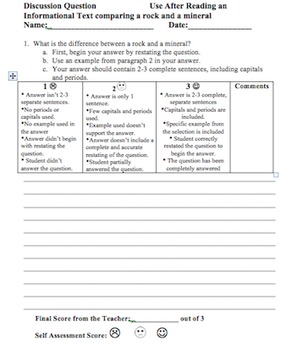
Discussion Question-Compare a rock and a mineral
This is a written assessment, designed to be used after reading an informational text on rocks and minerals. The discussion question asks the students to write about the differences between a rock and a mineral. The lesson includes a rubric, a place for students to do their writing, and a self assessment.
Grades:
4th - 6th
Types:
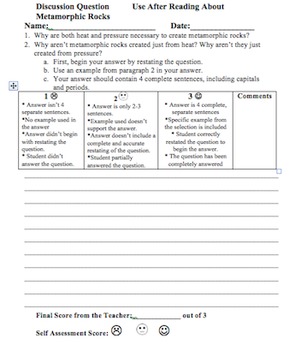
Discussion Question Use after reading about Metamorphic Rocks
This discussion question asks the students: 1. Why are both heat and pressure necessary to create metamorphic rocks?
2. Why aren’t metamorphic rocks created just from heat? Why aren’t they just created from pressure?
The activity includes a rubric, a place for students to do their writing, and a self assessment.
Grades:
4th - 6th
Types:
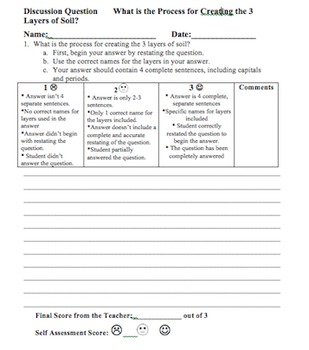
Discussion Question: What is the Process for Creating the 3 Layers of Soil?
This activity asks the question: What is the Process for Creating the 3 Layers of Soil? The assessment includes a rubric, a place for students to write their answers, and a self assessment.
Grades:
4th - 6th
Types:
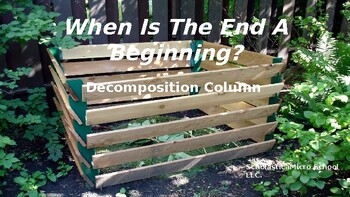
When The End Is The Beginning
Discover the world of composting in a bottle! Hands-on, eyes-on, mouths-on, and minds-on: Out of the trash and into the classroom this power point presentation is for beginning composting. Like many awesome things in life, the inspiration for such bottle creations came from a professor of plant biology named Paul Williams. He wanted to know what was going on in the middle of a pile of leaves so he scooped some up and put them in an empty pop bottle. The result: A Decomposition Bottle.
Subjects:
Grades:
Not Grade Specific
NGSS:
MS-LS2-2
, MS-ESS3-3
Showing 1-8 of 8 results

